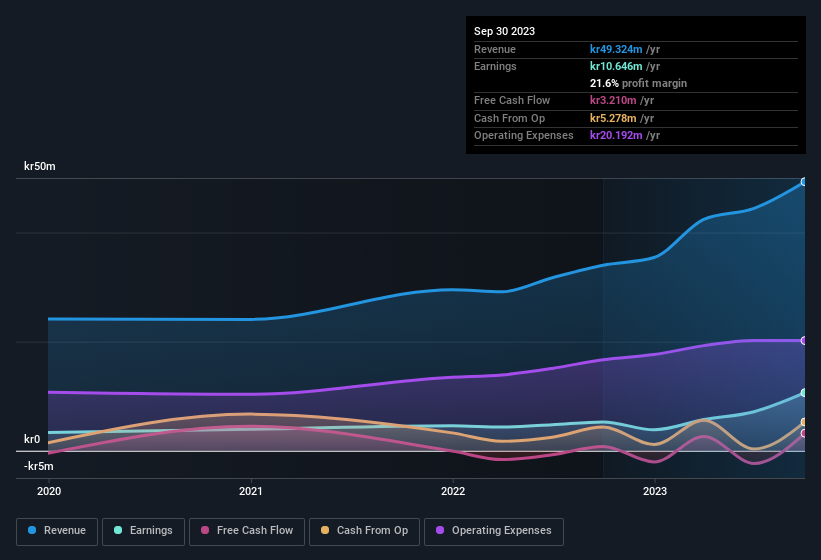- Sweden
- /
- Electronic Equipment and Components
- /
- NGM:BPCINS
BPC Instruments (NGM:BPCINS) Posted Healthy Earnings But There Are Some Other Factors To Be Aware Of
BPC Instruments AB (NGM:BPCINS) just reported some strong earnings, and the market reacted accordingly with a healthy uplift in the share price. However, our analysis suggests that shareholders may be missing some factors that indicate the earnings result was not as good as it looked.
See our latest analysis for BPC Instruments

Zooming In On BPC Instruments' Earnings
As finance nerds would already know, the accrual ratio from cashflow is a key measure for assessing how well a company's free cash flow (FCF) matches its profit. To get the accrual ratio we first subtract FCF from profit for a period, and then divide that number by the average operating assets for the period. The ratio shows us how much a company's profit exceeds its FCF.
As a result, a negative accrual ratio is a positive for the company, and a positive accrual ratio is a negative. While having an accrual ratio above zero is of little concern, we do think it's worth noting when a company has a relatively high accrual ratio. That's because some academic studies have suggested that high accruals ratios tend to lead to lower profit or less profit growth.
Over the twelve months to September 2023, BPC Instruments recorded an accrual ratio of 0.26. We can therefore deduce that its free cash flow fell well short of covering its statutory profit. To wit, it produced free cash flow of kr3.2m during the period, falling well short of its reported profit of kr10.6m. At this point we should mention that BPC Instruments did manage to increase its free cash flow in the last twelve months
Note: we always recommend investors check balance sheet strength. Click here to be taken to our balance sheet analysis of BPC Instruments.
Our Take On BPC Instruments' Profit Performance
BPC Instruments didn't convert much of its profit to free cash flow in the last year, which some investors may consider rather suboptimal. Because of this, we think that it may be that BPC Instruments' statutory profits are better than its underlying earnings power. The silver lining is that its EPS growth over the last year has been really wonderful, even if it's not a perfect measure. At the end of the day, it's essential to consider more than just the factors above, if you want to understand the company properly. If you'd like to know more about BPC Instruments as a business, it's important to be aware of any risks it's facing. To that end, you should learn about the 4 warning signs we've spotted with BPC Instruments (including 1 which doesn't sit too well with us).
This note has only looked at a single factor that sheds light on the nature of BPC Instruments' profit. But there are plenty of other ways to inform your opinion of a company. Some people consider a high return on equity to be a good sign of a quality business. While it might take a little research on your behalf, you may find this free collection of companies boasting high return on equity, or this list of stocks that insiders are buying to be useful.
Valuation is complex, but we're here to simplify it.
Discover if BPC Instruments might be undervalued or overvalued with our detailed analysis, featuring fair value estimates, potential risks, dividends, insider trades, and its financial condition.
Access Free AnalysisHave feedback on this article? Concerned about the content? Get in touch with us directly. Alternatively, email editorial-team (at) simplywallst.com.
This article by Simply Wall St is general in nature. We provide commentary based on historical data and analyst forecasts only using an unbiased methodology and our articles are not intended to be financial advice. It does not constitute a recommendation to buy or sell any stock, and does not take account of your objectives, or your financial situation. We aim to bring you long-term focused analysis driven by fundamental data. Note that our analysis may not factor in the latest price-sensitive company announcements or qualitative material. Simply Wall St has no position in any stocks mentioned.
About NGM:BPCINS
BPC Instruments
A technology company, develops, manufactures, and sells analytical instruments in Sweden and internationally.
Flawless balance sheet with questionable track record.
Market Insights
Weekly Picks

Solutions by stc: 34% Upside in Saudi's Digital Transformation Leader


The AI Infrastructure Giant Grows Into Its Valuation
Recently Updated Narratives


The "Sleeping Giant" Wakes Up – Efficiency & Monetization


The "Rate Cut" Supercycle Winner – Profitable & Accelerating


The Industrialist of the Skies – Scaling with "Automotive DNA
Popular Narratives


MicroVision will explode future revenue by 380.37% with a vision towards success


NVDA: Expanding AI Demand Will Drive Major Data Center Investments Through 2026



